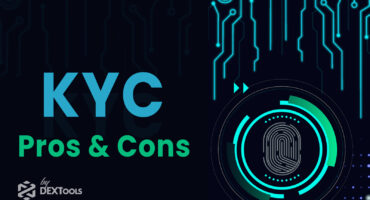What is DEXTools?
DEXTools is a powerful platform that provides users wit...

You can create any type of product documentation with Docy






Within DEXTools app, traders have a unique and handy DEXTScore as a reference on which tokens are the most reliable. But, because scammers take advantage of anonymity and lack of regulation in crypto and DeFi environments, scams abound and it is crucial to always Do Your Own Research (DYOR).
Below, we list the most common DeFi scams and how to avoid them. Both 7 proper scams, and also 7 “soft” scams (not always intended).
| Scam. | How to avoid it. |
| 1) Rug pull: token team withdraws liquidity. | Investigate the project team. Check liquidity lock… and use DEXTools! |
| 2) Honeypot: this is the most common scam. A type of rug-pull in which the token allows buying but not selling. | Check the smart contract and transactions. Investigate the project and verify the proxies. |
| 3) Dusting: they are malicious airdrops. They act like a Trojan: if you approve the token in a DEX (allowance), then the scammers will have access to your funds. | Not approving unknown tokens: unapproved tokens are harmless. Researching token and social information and checking liquidity. |
| 4) Address poisoning: these are transactions that take advantage of the singular properties of the blockchain to mislead users. | Always double check your transaction data to prevent transferring funds to the incorrect address by mistake. |
| 5) Fake token: these are tokens that pretend to be legitimate projects. They take advantage of user’s lack of information and rush. | Check social information and liquidity. Be aware of media news. Spend enough time researching and don’t rely on third parties, DYOR. |
| 6) Botting: the scammer leaves all funds in a wallet without gas and user sends some gas, which is redirected to the scammer’s wallet. | Take care of your private keys and remove allowances. Check transactions and do not approve unknown contracts. |
| 7) Fake presale: token team makes a presale. But the team does not actually list the token and disappears with the funds obtained. | Research the project carefully and always use platforms with verification, or invest in public or KYC equipment. |
| Soft Scam. | How to avoid it. |
| 1) Fee on transfer: token has purchase or sale fees that can be abusive and end up being retained by the team. | Checking socials, using aggregators with automatic slippage or using low slippage. |
| 2) Soft rug: Token’s team disappears leaving part of the liquidity, maliciously or not. Social networks become inactive or disappear. | Investing in public equipment and trustable companies, and choosing mature projects or those that support a product. |
| 3) Limit on sell: a “light” version of Honeypot, where the token has limits on buying and selling in quantity and/or price. | Checking social networks and monitoring transactions, and verifying the contract on specific platforms. |
| 4) Frontrunning bot: When you buy or sell, they mimic you in the same block, to make you pay more and take the difference. | Using low slippage or aggregators with an automatic slippage, and not buying large quantities at the same time in small pools. |
| 5) Contract exploit: token contains functions or bugs that allow funds to be obtained from users or pools. This can be intentional or not, and it is used in staking platforms, bridges… | Using only audited platforms and verifying that audits are true and done by experts. It is recommended to remove permissions from your wallet after using any platform. |
| 6) Memes: The token has no actual utility or company behind it. They are usually pump & dump schemes, and most of them disappear in days or weeks. | Not buying them or buying only those with strong background and a huge community behind. |
| 7) Bad tokenomics: harmful features affect price. Such as ultra-inflationary tokens, bad designed vesting and tokens blacklisted or with overflow. | Research and analyze the project carefully before investing, and also buy and sell your tokens wisely at the right time. |


The European Parliament takes action. https://t...

The conflict escalates Following the announcemen...